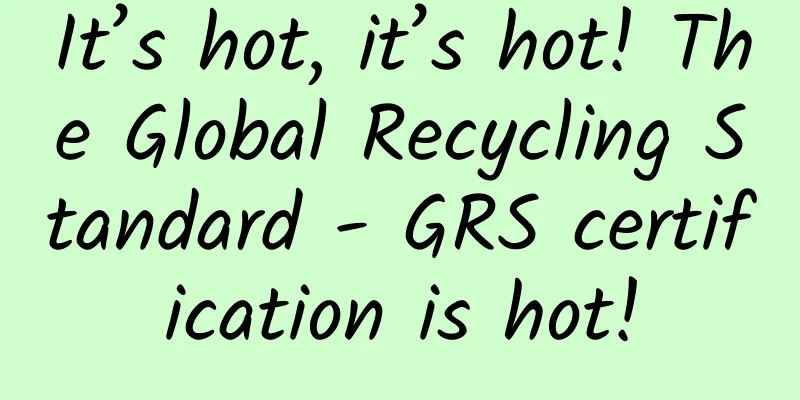It’s hot, it’s hot! The Global Recycling Standard - GRS certification is hot!

|
Recently, the global recycling standard GRS certification has become increasingly popular. Many clothing and textile companies are conducting factory inspections in full swing, because many customers will ask them whether they have passed the GRS global recycling standard certification. More and more questions are being asked about GRS, and more and more people are concerned about the impact of GRS certificates on enterprises. For this reason, Shanghai Chaowang has sorted out some past and present information about GRS certification . Which of them are worthy of our attention? With the deterioration of the environment and the shortage of resources, countries and governments are becoming more and more aware of the importance of the environment, recycling and reuse. The plastic waste produced by consumers is always much more than the earth can digest... Attention: Here comes the point! If the economy is to develop, energy extraction is inevitable. We have done our best to keep the climate from getting worse. So, what should we do with the garbage? What can't the earth digest? Where did it come from? Let humans help her digest it! Therefore, in order to solve this global problem, great scientists have developed a technology that can turn plastic "garbage" into textiles: Bottles--> Chips--> Melt spinning/short fibers--> Spinning and weaving--> Printing and dyeing and finishing--> Garments/home textiles. This process not only solves the problem of some of the "garbage" that the earth cannot digest, but also reduces the mining of new resources, killing two birds with one stone! Since the process of making fiber from bottle flakes is relatively mature, the textile and clothing industry was the first to start. The Global Recycling Standard (GRS) was originally drafted by Control Union (an international environmental management alliance certification body) in 2008, and on January 1, 2011, the ownership of this standard was handed over to the Textile Exchange. To this end, the Textile Trade Organization has issued an appeal to textile and clothing brands: as fashion clothing brands, they must set an example and make due commitments to the earth's environment. One person's call attracted a hundred people's response, and the recycling concept became popular among brands and suppliers. Major brands formulated relevant requirements and promised to fully use recycled materials within 5-10 years. Since then, GRS has become popular. |
<<: What is GRS Global Recycling Standard Certification?
>>: What is the GRS Global Recycling Standard certification process?
Recommend
ICS certification zero tolerance issues
ICS certification zero tolerance issues are ICS ma...
Coca-Cola Factory Audit Content - Forced Labor/Discrimination
Forced Labor Item noRequirementYes/No/NAComments ...
How is the eBay platform? Let the data speak for itself!
eBay, which started as an auction, has a 12-year ...
What is Banggood? How is Banggood's business development?
What is Banggu? Banggood Technology Co., Ltd. (Ba...
FDA – U.S. Food and Drug Administration
FDA is the abbreviation of Food and Drug Administ...
Three Ways to Sell on eBay
On eBay, sellers are provided with three ways to ...
Can individuals open a store on eBay?
A reader asked me whether an individual can open ...
What is Dear-lover? Introduction to Dear-lover brand
A well-known European and American sexy fashion w...
ICTI New Content
ICTI New Terms Section 1: General Guidelines 1.1 ...
Canada to revise toy standards
The Canadian Ministry of Health recently announce...
Application of HACCP Certification in Pure Water Production
Hazard Analysis and Critical Control Points (HACC...
Ann Taylor Human Rights Factory Inspection Checklist
Ann Taylor Human Rights Factory Inspection Checkli...
Factors Affecting the Effective Operation of ISO9001 Quality Management System
As we all know, ISO9001 certification management ...
What is the E-Commerce News? What are its features and columns?
E-Commerce News is an e-commerce media service br...
Huawei releases 2009 Corporate Social Responsibility Report in North America
Huawei has released its first annual Corporate Soc...









